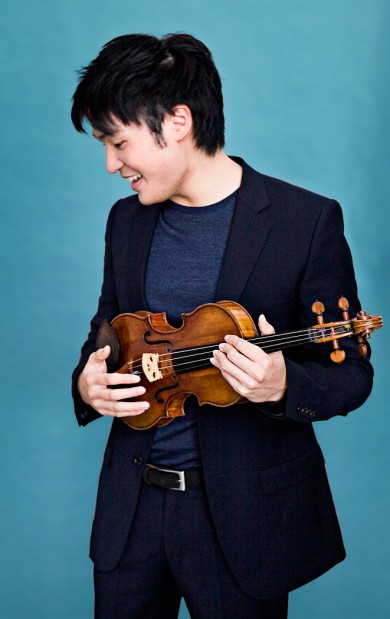Violinist Ray Chen shows supreme artistry and Old World heart

Violinist Ray Chen made his Miami debut Saturday night at Gusman Concert Hall.
South Florida’s recital stages have seen a procession of fine violinists over the past few years, but there’s a good chance that the very finest of all performed Saturday night at the University of Miami.
Ray Chen, 22, has that rare constellation of attributes — technical mastery, dramatic flair, a uniquely appealing tone and sheer largeness of playing — that add up to that overused and often undeserved term, “virtuoso.”
Born in Taiwan and raised in Australia — leaving him with an Aussie manner that charmed the Gusman Hall audience during his brief remarks — he won two of the most prestigious competitions in the violin world, the Queen Elisabeth and Yehudi Menuhin, and has a Sony Classical recording contract. He studied with Aaron Rosand at the Curtis Institute of Music in Philadelphia, and his playing clearly bears the stamp of Rosand, whose committed, emotional style, warm tone and revival of forgotten 19th-century concertos made him the arch-Romantic of his era.
Chen, who appeared as part of the Sunday Afternoons of Music series, gave a performance of Brahms’ Violin Sonata No. 3 in D Minor that came close to exaggeration but never crossed the line, as he deeply inhabited the work’s changing moods — grave and sinister in the swiftly running notes of the first movement, agonizingly emotional in the climactic high notes of the second movement. The final movement was the best, as he hammered away at the opening chords in an almost brutal manner, opening a headlong, hard-driving performance that was as powerful and energetic as one is ever likely to hear.
Chen’s committed style of playing, however, overpowered the first work on the program, Mozart’s Sonata for Violin and Piano in B-flat Major, K. 454. He played it as if it had been written by Tchaikovsky, with heavy bow pressure, excessive vibrato and too much sliding. Who breaks bow hair playing Mozart?
For the second half, Chen chose three works that demonstrated he is a musical athlete of the highest caliber, capable of rapidly playing two or three notes at the same time, zipping up and down the finger board and making his bow do pretty much anything he wanted. He did it all with a style and clear pleasure in showing what this small string instrument could do.
He opened with the Sonata No. 2 for unaccompanied violin, title Obsession, by the Belgian violinist-composer Eugène Ysaÿe. The work puts fragments of Bach’s Prelude in E Major for violin against the grim Dies Irae chant, in an enormously demanding polyphonic web. Chen’s bowing allowed the chant to come through the surrounding tangle of notes as if were a single melodic thread, giving an impressive demonstration of how much sound and complexity can emerge from a solo violin.
In his hands Saint-Saëns’ Havanaise was a few minutes of steamy tropical melody and virtuoso fireworks. As fast as he played, the music never lost shape and you never had the sense that his fingers were running ahead of his musicianship.
Saint-Saëns’ Introduction et Rondo Capriccioso displayed Chen’s extremely crisp style of playing rapid notes, with just enough bite to articulate them in a manner that allowed his fast playing to stay clear and comprehensible. He brought to both these Saint-Saëns works an extroverted style and intensity that brought them off as the showpieces they are.
He was unobtrusively accompanied on the piano by Julio Elizalde, whose best moments came in the sharply articulated performance of the Brahms’ sonata.
As his first encore, Chen played John Williams’ Theme from Schindler’s List, bringing to this emotional melody a sweetness and pathos that had eluded even Itzhak Perlman. The young violinist truly has a gift for soaring melody, and surprisingly this was the first point in the recital where he could put it on display. As his second encore, he played the Étude-Caprice No. 4 in A Minor by the 19th century Polish virtuoso Henryk Wieniawski, a nonstop rush of triplets that showed Chen can play extremely fast as well.
Posted in Performances
Leave a Comment
Sun Dec 11, 2011
at 2:17 pm
No Comments